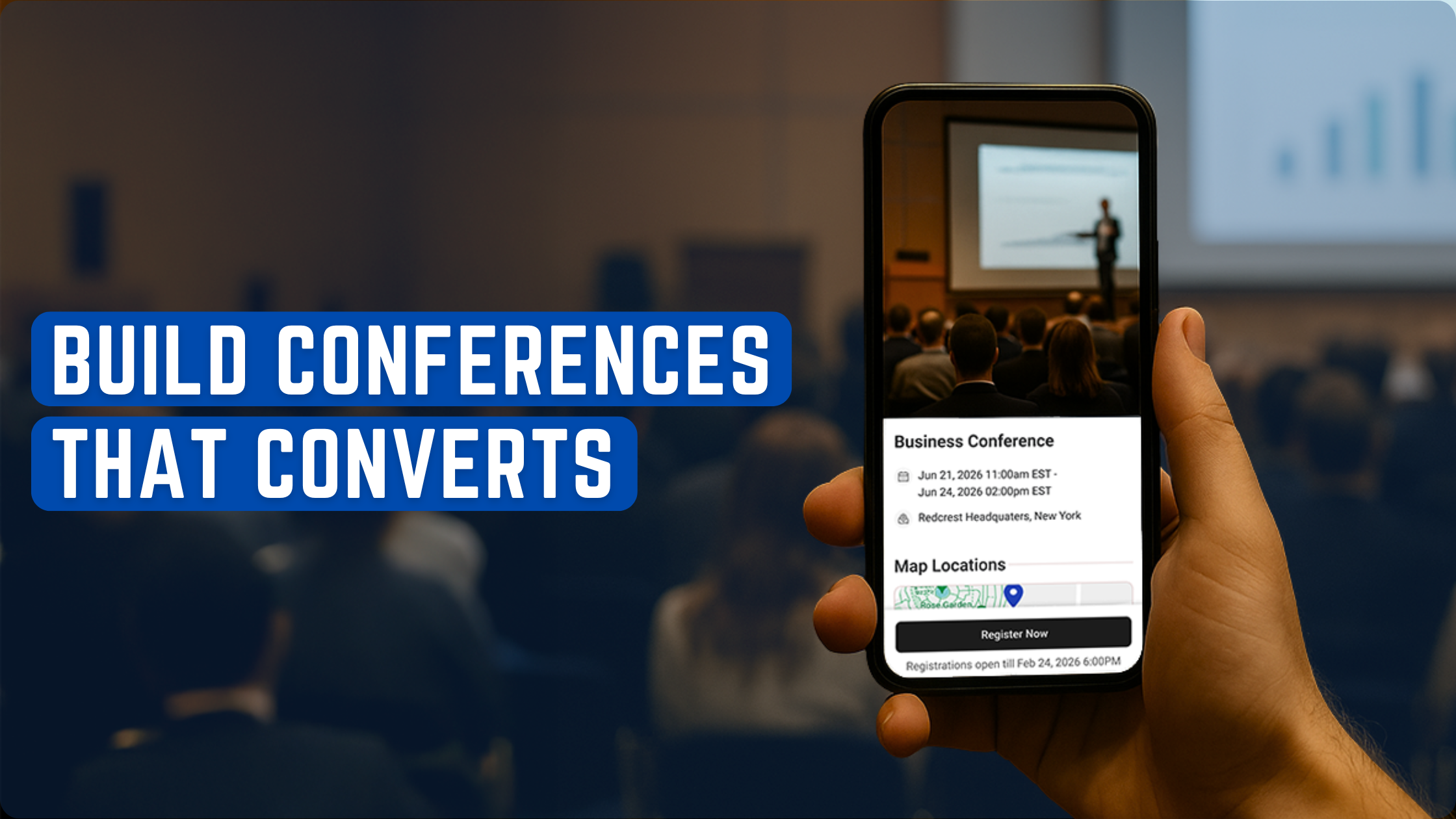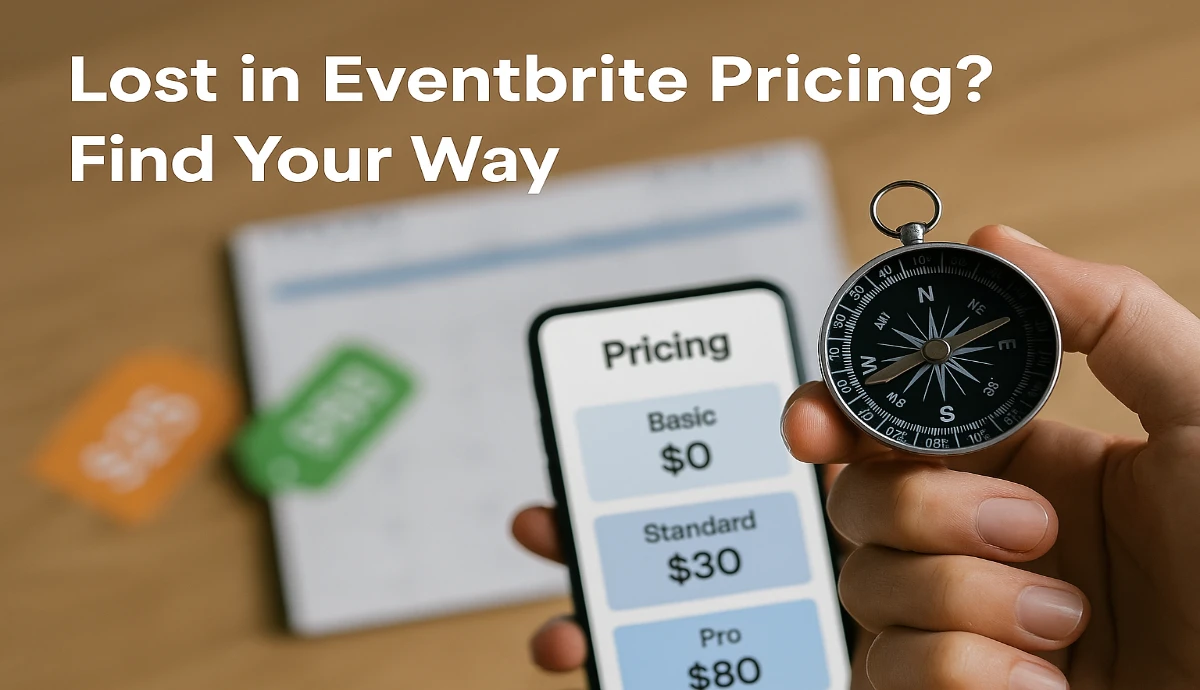If you are organizing an event, you probably have a lot to keep track of. After all, managing an event is not an easy job.
While you always try to organize every event the best way possible, it's only natural to miss out on a few things. But as a professional event organizer, you'd not want that to happen. After all, organizing a successful event does not only delight the client and the guests but is also important for your business.
Hence, you're looking for a checklist of best practices that can help you make your events a success.
In this article, we have compiled an exhaustive list of up-to-date event management best practices that can help you make your event a success.
A. Online event registration
Online event registration is an efficient and easy-to-use approach to encourage attendance and streamline the registration process.
With the increasing trend of digitization, it not only simplifies the process but also allows for ease of data collection and management.
Below are few best practices related to online event registration:
1. User-friendly registration form
Ensure your online registration form is simple and easy to understand. Avoid asking for too much information that might dissuade potential attendees from completing the form.
With Ticket Generator, you can build a simple event registration form in minutes and start collecting your data.
2. Secure payment gateway
If your event requires payment, ensure that you have a secure payment gateway integrated to your registration form. This assures your attendees the safety of their payment details.
3. Seamless ticket generation
A seamless ticket generation process is essential to ensure that you have complete control over your event tickets. This is especially important when you're selling tickets for a large event. You want to make sure that attendees can only register for an event once and also avoid them from sharing their tickets with anyone else.
With Ticket Generator, you can easily customize the design and layout of your tickets and embed barcodes or QR Codes into them.
You have hundreds of design to choose from and you can even create your own unique design.
4. Data analysis
Use the collected data to perform an analysis. This will help you understand your attendees better and enable you to make informed decisions about your event.
You can use data to find out how many people attended your event, who they are and where they come from. You can also evaluate the effectiveness of your marketing campaigns by analyzing the number of tickets sold per channel, or even see which channels have brought you more revenue.
B. Event management best practices
Now you know how to set up your event page. Let's see how you can manage your event better:
1. Set your event goals
As an event organizer, you must be very clear about your event goals. It could be to raise money, promote a product, or organize a festival.
One thing that remains constant is that you need to devise the best way to attract and capture your audience's attention. After all, an event is all about your audience's engagement.
In case you don't know your event goals, there's a simple strategy you can follow to find out:
a. Identify the audience
The first step is to identify your target audience. That means who do you want to attend the event? Will it be people working in the corporate sector, teenagers seeking fun for the weekend, or people willing to make a purchase? You may also want to ponder if are you hosting the event to attract new customers or engage existing ones? And how many attendees do you expect?
b. Hidden aim of your event
The second is what is your event's hidden aim? That means do you want your event to educate the attendees, motivate them, or get them to take an action (such as making a purchase).
c. Measurable goals
Are the goals measurable? After all, you want to determine the performance of your event. For example, how many people attended and what was the ROI?

2. Use smart management tools
Event planning requires a great level of organizational and time-management skills. This is especially true for big events that want to host thousands of guests. And your staff may not suffice to handle a grand event by itself. So you may need external support. For example, a service provider to generate event tickets or invitations, ensure event security, help with event branding, and even provide event analytics.
However, an event management tool such as Ticket Generator can help you cost-effectively do it all. It allows you to do many things such as:
- Generate branded tickets and send the them to guests digitally
- Create an event registration page where guests can register for the event and get secure event ticket automatically
- Monitor the event analytics such as how many people attended, how many tickets were valid, invalid, or duplicate
- Ensure that only authorized guests are allowed into the event premises
Thus, it allows you to keep track of your event and, in turn, you can track sales.
3. Event Budget
You know how difficult budgeting is. After all, it is one of the most challenging part of event planning and execution.
Hence, it is important to produce a detailed, well-thought-out budget plan. This can help you track revenue, save time, and generate ROI.
Your financial budget should be done by first researching the event budget costs to get estimated pricing. You can do it by checking pricing data from previous events and taking inflation into account.
Once done, you then need to create a comprehensive list of budget-related tasks required such as:
- Food and beverage
- Guest accommodation and travel
- Marketing and promotion
- Staff salaries
- Security
- Service fees and other cost components
When done, you can then make sure that every arrangement is executed well within the budget.
4. Event Marketing
Now that the event budget and planning are done. The next thing is to promote your event. After all, no event is successful without having attendees show up for it. And you'll need an event marketing strategy to get the guests to your event.
You can use social media, email, print, or digital marketing to meet your marketing goal here.
Along with this, you can also reinforce your event's branding. Tools such as Ticket Generator help you do it.
It allows you to add your brand's colors to the tickets. Thus, the tickets do not only help you invite guests and prevent trespassing but also strengthen your brand's presence.
5. Undergo a risk assessment
You need to first understand and beware of all the risks concerning your event. After all, you would want to ensure an A-grade event for the attendees.
To do it, you need to be extra cautious and take tight security measures. This is especially true if you are inviting a VIP or a celebrity to the event. The same also applies if your venue is close to a risk-prone area.
If you do such a risk assessment, you get to know the prominent threats facing your event. And thereby, you'll be able to take appropriate event security measures.
6. Form multiple emergency exit points
Emergency exit points are a must in every event. And you need to ensure that they are visible at all times. That's because this would ensure that your guests know where they need to head on to during an emergency.
It will also help streamline the crowd and reduce the likelihood of crowd crush or stampede. To smoothen this process, you can also assign your staff at these points.

7. Multiple event coordinators
Say you are organizing a large event. That means your event will see a huge footfall. Hence, you need to ensure a hassle-free entry passage.
To do it, you can form multiple entry points with the event coordinators. They can validate the tickets and ensure no trespassing or crowding at these points. Hence, you will have a safe and secure event.
Tools such as Ticket Generator, allow you to add your staff as ticket validators. Thus, they can validate the tickets on your behalf. Sounds convenient, right?
8. Event ROI
Measuring the success of your event is crucial to understanding the effectiveness of your planning and marketing strategies. Calculating your event's return on investment (ROI) helps you determine whether the event met its objectives and provides insights on areas of improvement for future events.
To measure event ROI, you need to follow the following steps:
- Establish clear event objectives: Set specific, measurable, achievable, relevant, and time-bound (SMART) goals for your event, such as attendance rates, brand awareness, or revenue generation.
- Identify key performance indicators (KPIs): Determine the metrics that will help you track progress toward your objectives. Examples of KPIs include number of attendees, social media engagement, and ticket sales.
- Collect data: Gather data before, during, and after the event to measure your progress. Use tools such as surveys, ticketing systems, and social media analytics to collect this information.
- Analyze the data: Compare your results against the established objectives and KPIs to measure the success of your event.
- Calculate ROI: Divide the net profit (or other benefits achieved) by the total event cost, then multiply this figure by 100. This can help you understand the financial success of your event and identify areas for improvement in future events.
- Adjust strategies for future events: Use the insights gained from your ROI analysis to improve and optimize your event planning, marketing, and execution for future events.
If you approach event planning and management with a focus on return on investment (ROI), you can make data-driven decisions that will help to improve your overall results.
So make sure that you are putting constant efforts into optimizing your event ROI, and you will find that your events become more successful.
Conclusion
That's it. These are all the event management practices you need to follow to ensure an A-grade event.
You have everything that you need to get started. Now what's left is designing your event, implementing it, and analyzing your results. Once you're done with this, the next step is to repeat the process again and again. This will help you become a better event manager over time.






.gif)






